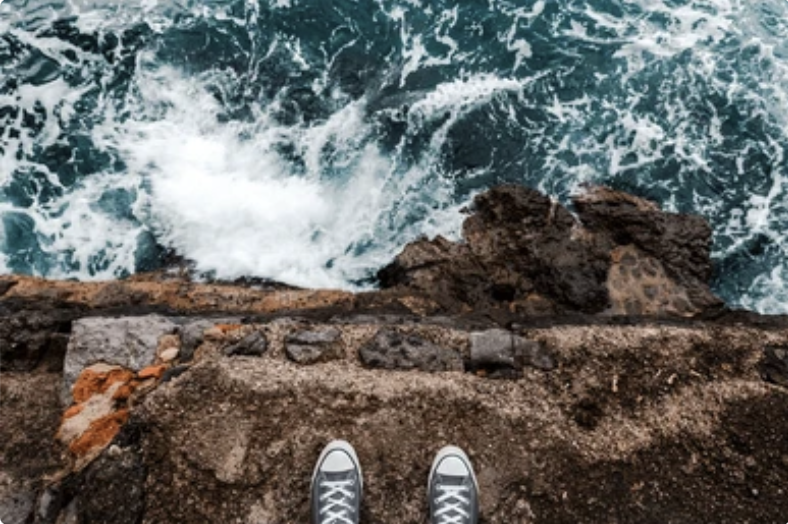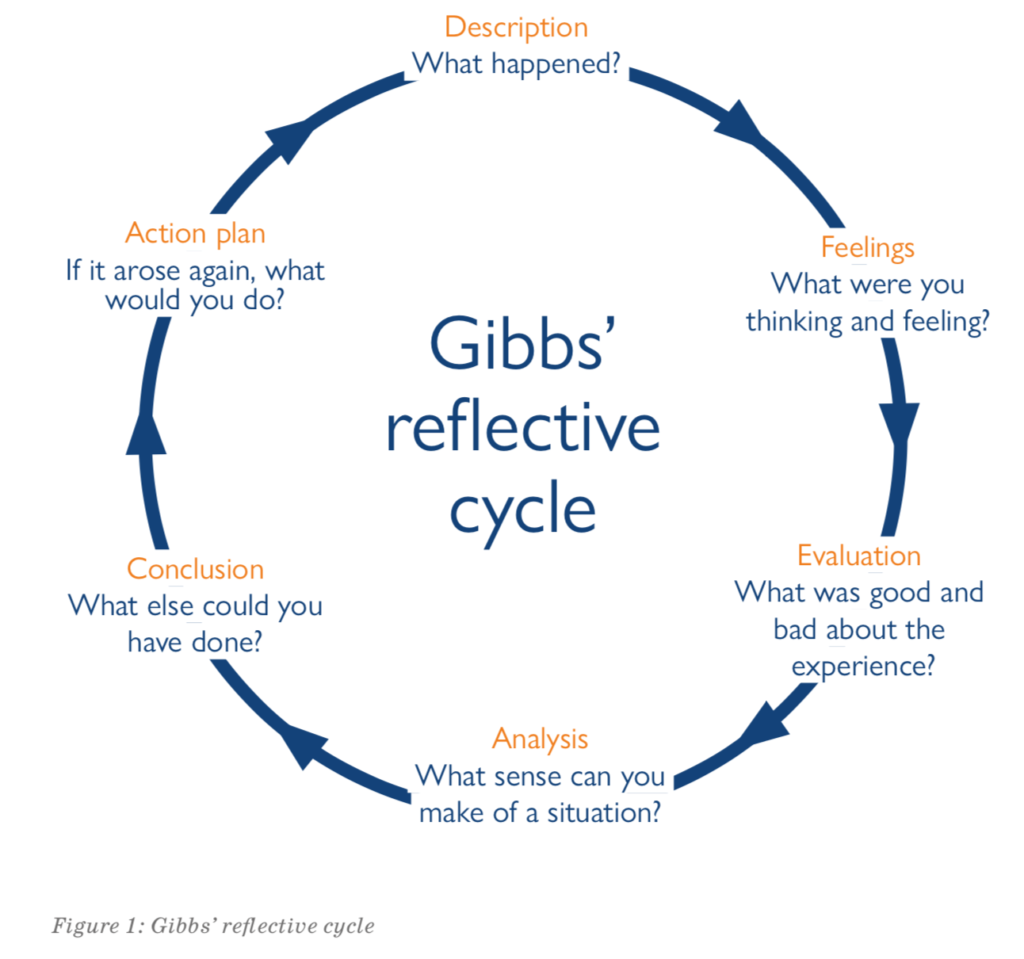We’ve all done it, Stood at the top of a diving board or a tall ledge and been petrified of the abyss below. Your legs feel like jelly, your stomach feels like its in your throat and your heart may as well be outside your chest with how hard it’s beating. Mock Interviews are that feeling but on steroids.

Once I got over these feelings, I knew I had a job to do. I had to go into this mock interview with my peers with the utmost professionalism and preparation. Now I look back and I have a few areas I know for the future I can improve on as well as what I did well and can use again in the future.
In my mind, for me to reflect and review this process and the ups and downs of it, the best reflective model to use is Gibbs Methods of Reflection.

Description: What Happened?
Through our Placement Module, we where afforded the opportunity to partake in simulated interviews which allowed us to get experience of completing the process alongside having our peers and colleagues analyse our performance and giving strengths and weaknesses of our performance and abilities. The idea of this can be terrifying as you don’t know what can happen and you’re not the one in control of the situation.
First I had to decide on a job that I wanted to interview for, which I ended up deciding on Content Creator for Formula 1, as I’m very keen on getting into the sports world of media and content, as a massive sports fan. So I had to plan for my interview and had to organise my CV an make sure I crafted it perfectly for my desired position. Then I had to organise myself, make sure that I was as prepared as I could be so I sat down with my Dad and did some practice questions.
Then that dreaded day rolled around… Interview Day! We all piled into that lecture theatre and began the daunting process. We then split into groups and began to start the interviews. I knew everyone in my group which but my shattered nerves slightly at ease, but after the first person got up and smashed the interview that feeling came coursing back through my body worse than ever before. Once we finally got round to me I could barely speak for nerves and the sweat was running down my back. I got up and did my interview, panicked and just rambled but ultimately wasn’t as scary as previously lead to believe. Once the process of my interview came to a close I realised that I hadn’t actually done that badly. My group mates reassured me and told me they thought I did very well but just need to be careful of, shock horror, needless rambling! Ultimately when I look back on the experience I realised that over all the process is nowhere near as nerve wracking and awful as I thought and went well.
Feelings: What were you thinking and feeling?
Once I started to begin the process of starting to prepare for this interview I realised how little time I have left and uni and how still unclear I am at what I actually want to do with my life. The thought of having to sit in-front of my peers and classmates and talk about myself and complete an interview process terrified me to my core.
Once I actually started to review my CV and prepare for the interview, I realised that actually I do know a lot more and I’m more prepared than I thought and knew more about what I actually wanted to do than previously believed. It also helped me when I spoke to my friends and they told me they were equally as nervous and it wasn’t just me that felt like that. Ultimately in hind sight of the process of preparation and the actually practical of carrying out the interview, it wasn’t that bad and actually helped me overcome my fear of interviews.
Evaluation: What was good and bad about the experience?
In retrospect, my fears of the interview and experience where non based and looking back created a feeling inside me that was unnecessary as we as group enjoyed being able to conquer our fears of interviews alongside learning for the better and improving our skills.
However, my preparation, thorough as it was, could have been more focused and niche as there where certain things that I came across within the experience such as specific questions which left me stumped and I had to think on my feet and instead being more prepared for things like that in the future.
“Fear of the unpredictable and your ability to respond to it in a way that favorably represents your abilities and personality can be anxiety provoking, but it is important to perform well in the interview process.” (Best, 2022)
Analysis: What sense can you make of the situation?
I would be lying if I didn’t agree that the experience was mind bogglingly scary initially but once I got past that point I realised that I was being silly by thinking in that mindset and that ultimately I should be confident in my abilities to conduct myself and convey my ideas and opinions.
One of the criticisms of one of my peers was that I tend to talk a lot around the subject instead of tackling the subject of the question quickly and clearly, which is something I now know I need to work on for the future and work through in future preparation. Another thing was that I tend to repeat myself as a way of trying to make my point instead of just being confident in my ability to communicate. These things allow me to adapt and improve for the future and focus my mind on the things I need to improve for future interviews.
Conclusion: What else could you have done?
In Conclusion, I definitely didn’t mess it up like I initially believed. I was able to convey myself in the correct manor but for the future I will delve deeper into my preparation for each aspect of the job and preparing to my fullest capabilities alongside precisely answering each question, clearly annunciating and not repeating myself.
“We do not learn from experience. We learn from reflecting on experience.”
Action Plan: If it arose again, what would you do?
I would go into the interview, in the future, with utmost confidence and proper annunciation. I would also prepare for those future scenarios using reflective models such as Gibbs or Boud etc. which would allow me to actually review my performances in the interviews.
Ultimately, I would use my preparation to benefit me in the long run to help me perform the best in the future interviews, but ultimately enjoy the experience and perform to my maximum.
Bibliography:
Best, S.L. (2022) ‘Interview skills’, Navigating Organized Urology, pp. 9–14. doi:10.1007/978-3-031-05540-9_2.
Jasper, M. (2013) Beginning reflective practice. Melbourne & London: Cengage Learning.